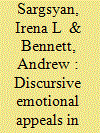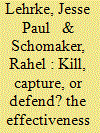|
|
|
Sort Order |
|
|
|
Items / Page
|
|
|
|
|
|
|
| Srl | Item |
| 1 |
ID:
152818


|
|
|
|
|
| Summary/Abstract |
How are some rebel leaders able to sustain violent collective action but others not? Most theories focus on leaders' use of selective incentives and efforts to lower their transaction costs and raise those of the government. We argue that a leader's ability to arouse emotions of anger, humiliation, and fear is also critical. Foreign leaders and former exiles typically lack the legitimacy and understanding of local politics necessary to incite such emotions. We test this argument in three case studies in Iraq between 2003 and 2011. In this period, the Sadrist Trend sustained violent collective action and gained lasting political power, the Islamic Supreme Council of Iraq failed to maintain its influence, and al-Qaeda in Iraq first gained and then lost its ability to mobilize violence.
|
|
|
|
|
|
|
|
|
|
|
|
|
|
|
|
| 2 |
ID:
152820


|
|
|
|
|
| Summary/Abstract |
We combine evolutionary and neurobiological models to provide a theoretically rigorous framework for understanding the origin of political leadership in democratic structures and how such qualities interact with institutional incentives and constraints. Evolutionary, behavioral-genetic, neuropsychological, and physiological studies have identified biological systems related to particular types of leadership behaviors as well as the emergence of leadership itself. These biological systems emerge during specific life stages and interact with a person's life history, influencing the environments one selects into and the perception of those experiences and subsequent reactions to them; these circumstances reinforce, suppress, and inspire various leadership characteristics. Our framework provides insight into the foundational basis of leadership qualities and explains why and how we observe variation in such traits. The evolutionary functions of leadership, including approaches to collective action problems, leader–follower dynamics, institutional and organizational environments, and leader attributes are discussed, and in so doing, we propose several novel questions that can be addressed from this perspective, which suggest new and fruitful lines of research in leadership studies.
|
|
|
|
|
|
|
|
|
|
|
|
|
|
|
|
| 3 |
ID:
152822


|
|
|
|
|
| Summary/Abstract |
This article examines the effectiveness of contemporary counterterrorism strategy in the global fight against terrorism from 2001 to 2011. We seek to maximize the comparative approach more than most existing studies by examining three tactics (killing, capturing, and defending) applied at three scopes (leader, operational, and broad) on three levels (global, movement [jihadi], and organizational [al-Qaeda and Taliban]), while also measuring effectiveness along several quantitative, qualitative, and spatial dimensions. Drawing from resource theory (and its derived analytical approaches) and empirical terrorism studies, we formulate competing hypotheses that are quantitatively tested using a dataset with several original aspects. We find that both killing and capturing can have large effects but these effects vary based on both states' and terrorists' targeting strategies. The most interesting specific findings are that drone strikes seem counterproductive for counterterrorism while renditions seem effective. However, these effects were dwarfed by those of increased defenses, which reduce attacks in the West while redirecting them to other areas in the world. While we find the theory mostly sound, though in need of refocus, we believe current policy trends foretell an increase in terrorist activity in the coming years.
|
|
|
|
|
|
|
|
|
|
|
|
|
|
|
|
| 4 |
ID:
152821


|
|
|
|
|
| Summary/Abstract |
Since 2001, Western troops have been heavily engaged in combat in Iraq and Afghanistan raising once again the long-standing question of why small groups of soldiers are willing and able to fight together. Drawing on evidence from recent campaigns, and specifically focusing on American and British forces, this paper examines why small Western units have generally been effective in combat. Against the primary group thesis, originally proposed by Morris Janowitz and Edward Shils in 1948, the article claims that training and battle drills, not interpersonal relations, are the primary factor in generating performance on the battlefield. Moreover, high levels of training alters the relations between soldiers, giving rise to a core group which generates distinctive patterns of motivation.
|
|
|
|
|
|
|
|
|
|
|
|
|
|
|
|
| 5 |
ID:
152819


|
|
|
|
|
| Summary/Abstract |
This article focuses on the efforts made by Israel to stymie Iraq's nuclear program from 1974 to 1981. It argues that to fully understand the effects of Israel's campaign, its nonmilitary components need to be addressed, rather than focusing chiefly on the 1981 bombing of the Osirak reactor. While existing views hold that the bombing was counterproductive, this study finds Israel's overall campaign to have been a sophisticated and effective effort at curtailing Saddam Hussein's program. The campaign's main achievement was in buying time that allowed external events to take place, building towards the eventual collapse of Saddam's nuclear program. While Israel's campaign demonstrates that counterproliferation can work, there are instances where it can be highly counterproductive. Buying time can also be achieved without the use of force, through coercive means, as demonstrated by the Iranian case over the previous decade. However, various gradations of military intervention remain an important tool for preventing nuclear proliferation, as demonstrated by the cases of Osirak and the 2007 destruction of the Syrian nuclear reactor in al-Kibar.
|
|
|
|
|
|
|
|
|
|
|
|
|
|
|
|
| 6 |
ID:
152817


|
|
|
|
|
| Summary/Abstract |
Unrecognized statelets may be forming in the Eastern Donbas region of Ukraine under the aegis of Russian protection—a “frozen conflict.” Georgia's past provides a useful cautionary tale in reference to Ukraine's probable future. The very same conceptual debates that are currently underway in the West with respect to Ukraine—“credibility of great-power security guarantees versus chain-ganging”—have, over the past twenty years, generated policies that facilitated the rise of political coalitions within Georgia that prefer war with Russia to any other outcome.
|
|
|
|
|
|
|
|
|
|
|
|
|
|
|
|
|
|
|
|
|